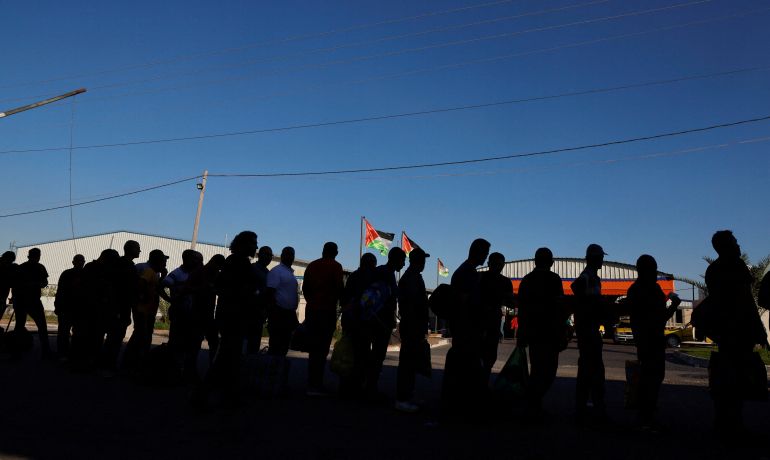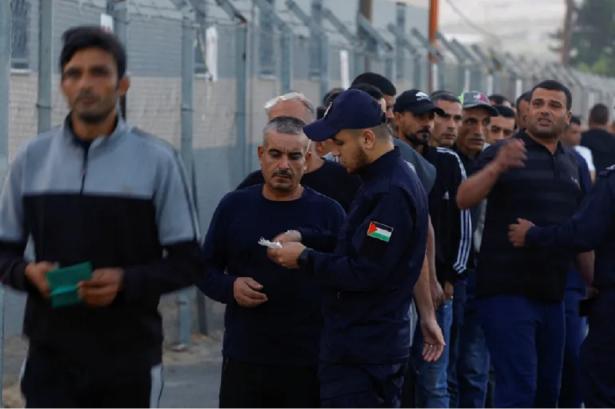Nablus, occupied West Bank – At three o’clock in the morning, Loay Zaqout found himself staring up at Israeli police surrounding him and two of his colleagues where they were staying in Nazareth.
The police began beating them up, shouting insults before arresting them in the early hours on Monday and taking the three Palestinian workers to the station.
“They treated us horribly because, they said, we were from Gaza,” the 31-year-old father said. “The police threatened to return us to Gaza and said that our workers’ permits were invalid.”
Worrying for family, friends
Zaqout, from the central town of Deir al-Balah in the Gaza Strip, has been working in Nazareth for about a year in an auto body shop.
He is one of more than 21,000 Palestinian workers from Gaza who work within Israel in order to support their families – he supports his wife, their three children, and 16 members of his extended family.
On Tuesday, he was among about 100 workers who eventually managed to reach Jenin in the occupied West Bank, battered and frightened and wondering how they would be able to get back to their families.
After being held overnight by officials in Nazareth, away from his two colleagues who were also from Gaza, they were released the next morning with no information.
“I didn’t have my phone, any money or my identity card,” he said, adding that he managed to hitch a ride about half an hour south, to Jalama, from where he crossed into Jenin.
Zaqout had wanted to return to Gaza on Sunday, “but the war started on Saturday, and now I am on one side and my family is on the other, and I cannot reach them”.
The unprecedented surprise operation launched by the armed wing of Hamas on Israeli military bases and towns meant that their plans to go home were put on hold indefinitely and the siege Israel was laying on Gaza meant they could not reach their families living there because of power blackouts and phone service interruptions.
Israel on Saturday declared itself in a state of war and began relentless bombing of the Gaza Strip, one of the most densely populated areas in the world. According to the health ministry, 1,100 Palestinians have been killed and more than 5,000 others wounded.
Laila Ghannam, governor of Ramallah and al-Bireh, told Al Jazeera that nearly 600 Palestinian workers from Gaza are in the occupied West Bank cities of Ramallah, Hebron, Nablus and Jenin.
“As of yesterday evening, the last batch of workers from the Gaza Strip who work within the Green Line [the boundary of Israel] arrived,” she said on Wednesday. “The number of workers has reached 595 workers.”
“They’ve told us that they can’t reach some of their friends or relatives, who also work inside, which is worrying,” she said.
According to Ghannam, many workers had serious injuries to their faces from being beaten by Israeli security forces.
“Dentists will be made available to the workers to treat them,” she said.

Palestinian workers wait to cross the Beit Hanoon (Erez) crossing to Israel in the northern Gaza Strip, August 3, 2023 Mohammed Salem/
Palestinian workers surrounded by ‘Jewish extremists’
Unemployment in the Gaza Strip – which has been under an Israeli-Egyptian blockade since 2007 – hovers at 50 percent. Jobs in Israel are in high demand, paying up to 10 times as much as similar jobs in Gaza.
Shaher Saad, the secretary-general of the Federation of Palestinian Trade Unions, said the conditions Palestinian workers suffer inside Israel are extreme.
Dozens of workers have been attacked and, if lucky, expelled to the occupied West Bank.
“Hundreds of workers are contacting us to get them out of the areas they are stuck in. Sometimes we can’t do anything because they are surrounded by Jewish extremists and are under siege,” he said.
“They’re scared because there’s a lot of tension, especially after these extremists called for the workers to be taken as hostages.”
“We’re working around the clock to get these workers out,” he added. “I call on the Palestinians living in the areas occupied in 1948 to help these workers and get them to the nearest safe area.”

Palestinian workers gather at the Beit Hanoon (Erez) crossing between Israel and the northern Gaza Strip, on September 28, 2023, after the crossing was reopened by Israeli authorities (Mohammed Abed)
Ammar Abu Yaish, the head of the Jenin Chamber of Commerce and Industry, told Al Jazeera that Israeli forces corralled and dumped 31 workers from Gaza who had been working in the northern city of Safad at the Jalama checkpoint on Tuesday.
“The men showed signs of having been assaulted,” Abu Yaish said, adding that they were stripped nearly naked.
Palestinian security forces on the other side of the crossing received the workers and provided them with food and shelter.
“They all have permits to work inside Israel,” Abu Yaish said, explaining that the workers had a right to be there. “Palestinian trade unions called on workers inside Israel to stay indoors and not go to work.”
Osama Sbeih is from Gaza City and has been working in construction in the Rishon area (south of Tel Aviv) for two years.
He says that on Monday, at about midnight, large forces from the Israeli army stormed the dorms where about 37 workers from Gaza lived.
“They began searching, checking our identities, beating us, and insulting us,” the 34-year-old said.
“They expelled us towards one of the checkpoints near Ramallah. We did not have a single penny, and we were not allowed to take any of our belongings.”
Sbeih, who supports his wife, son, parents and sister, said they slept on the road on the first night before Ramallah officials found them accommodation in a hotel.
“We’re so worried about our families, and about our own fates,” he said.


Spread the word